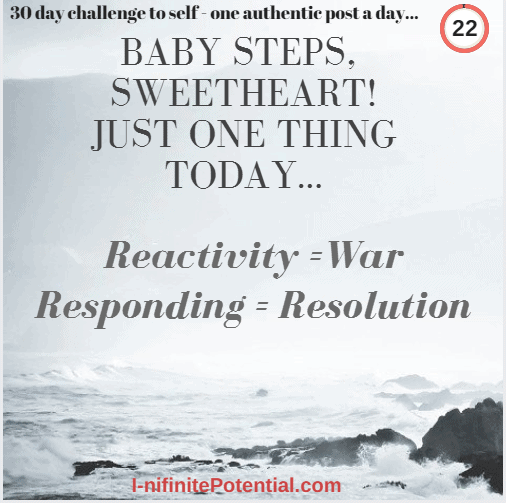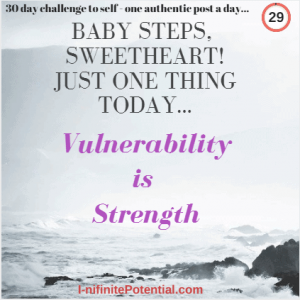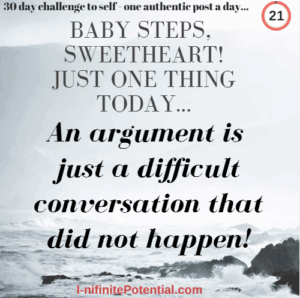5 steps to becoming a more effective communicator:
Reactivity in ourselves and other causes wars.
The all out anger ones.
The endless bickering about everything kind.
The vengeful, I-will-get-you-back-how-dare-you kind.
The three week silent treatment standoffs.
The let’s-pretend-it-never-happened ones.
The passive aggressive, “I do not even realize I am actually angry under my seemingly friendly facade” wars
Reactivity is a hard beast to tame, but we can do it, baby steps!
1. Understanding Triggers
Before we can understand what our triggers are, we will have to do a really good examination of our triggers. The bad news is that we are usually completely unaware that we are a bundle or reactions, triggered by all sorts of unconscious fears and habits. The second problem is that we so totally, utterly, completely believe that there is only one way of looking at life and how to self protect, and that would be the way we adopted for ourselves in order to survive our childhoods.
So what can we do then?
We can read a good book with exercises, like Life Lessons for Adult Children by Judy Klipin or Emotional Sobriety by Tian Dalton, or we can seek an opinion outside ourselves, preferably not a co-dependent friend. The solution is awareness, and awareness sometimes involves getting an outside opinion. And it is well worth it!
2. Have a clear understanding of our wants and needs
We cannot communicate what we want and what we do not want if we do not have a list of wants and needs! If we are so into people pleasing that our worth comes from what we are for others, our own well will be dry. And It will quite simply be because we have not identified that we are worth “wants and needs”, and therefore have not communicated clearly that we have wants and needs!
3. Develop a good sense of self-worth and self-respect
A small percentage of people will have a real inner sense of self-worth and self-respect, simply because they had parents who gave them the unconditional love that they needed in order to flourish. The rest of us, tough luck! We were parented by imperfect people who did their best, often in trying circumstances, to raise us well. But a lot of us fell through the cracks, or had life experiences that did not teach us that we are valuable simply for being born. Some of us miraculously find that we are good at stuff, and grow ourselves an external sense of self esteem, based on what we do and what we achieve. That helps, but we have to learn to develop self-esteem around liking and accepting ourselves in order to have real self-esteem.
4. Check if you are in adult mode
If you find yourself going into victim, whining, blaming and being helpless – bad news. You are not in adult!
If you find yourself wagging your finger, sounding like a morally superior parent or admonishing teacher, equally bad news! You are not in adult!
Being adult feels good, devoid of nauseating, throat-gripping emotions. It feels empowered, but not superior. It feels self respecting, but not rejecting. It is taking responsibility for your part but not being a doormat.
5. Stop, give yourself time, check for emotionality
Once you can get yourself to this point, your have the emotional wherewithal to actually formulate what you want to say, based on the outcome you desire!
And an adult outcome always has a desire for an effective outcome. It is not punitive or vengeful. It does not demoralize self or anyone else.
It is born out of a real desire for the most benevolent outcome for all.
I hope that you can find something useful in here.
Always here if you want to chat.
Much love
Louise




